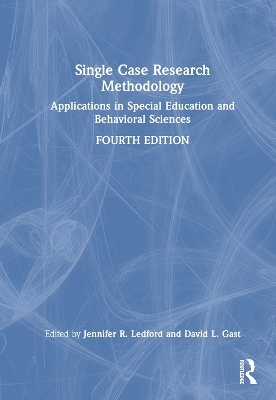
Single Case Research Methodology
Routledge (Verlag)
978-1-032-27931-2 (ISBN)
- Noch nicht erschienen (ca. Juni 2024)
- Versandkostenfrei innerhalb Deutschlands
- Auch auf Rechnung
- Verfügbarkeit in der Filiale vor Ort prüfen
- Artikel merken
Jennifer R. Ledford is an Associate Professor in the Department of Special Education at Vanderbilt University. David L. Gast is Professor Emeritus of Special Education in the Department of Communication Sciences and Special Education at the University of Georgia.
Preface
Section 1
1. Research Approaches
Callouts:
1-1: Questions for Scientist-Practitioners
2. External Validity and Generalizable Knowledge
3. Establishing Internal Validity via Within-Study Replication
4. Selection, Characterization, and Measurement of Dependent Variables
Callouts:
4-1: A Commentary on Why Interval Systems are Used Despite Evidence of Inaccuracy
5. Reliability and Validity of Dependent Variables
6. Development and Measurement of Independent Variables
7. Measuring Generality and Social Validity in Single Case Research
Callouts:
7-1: Labeling Generalization and Maintenance Conditions
8. Data Representation and Performance Characteristics
Section 2
9. Conducting Studies Using Sequential Introduction and Withdrawal of Conditions
Callouts:
9-1: Baseline, Business-As-Usual, and Treatment Conditions
9-2: Applied Example of Withdrawal Design
9-3: Applied Example of Reversal Design
9-4: Applied Example of Multitreatment Design
9-5: Applied Example of Changing Criterion Design
10 Analyzing Data from Studies Using Sequential Introduction and Withdrawal of Conditions
Callouts:
10-1: Should I Include Extra Phases to Establish Non-Effects?
10-2: Reliability of Visual Analysis
10-3: Applied Example of Withdrawal Design
10-4: Applied Example of Reversal Design
10-5: Applied Example of Multitreatment Design
10-6: Applied Example of Changing Criterion Design
11 Conducting Studies Using Time Lagged Condition Ordering
Callouts
11-1: Selecting Intervention Targets
11-2: How Rigorous are Nonconcurrent MB Designs?
11-3: Applied Example of Multiple Baseline Across Participants Design
11-4: Applied Example of Multiple Baseline Across Behaviors Design
11-5: Applied Example of Multiple Probe across Behaviors Design (Days Variation)
11-6: Applied Example of Multiple Probe Across Participants Design (Days Variation)
11-7: How do I Choose Between Multiple Baseline and Multiple Probe Design Variations
12 Analyzing Data from Studies Using Time Lagged Conditions
Callouts
12-1: Masked Visual Analysis
12-2: Baseline Lengths: How Different is Different Enough?
12-3: Inconsistent Inter-Participant Replication in Single Case Design Studies
12-4: Applied Example of Multiple Baseline across Participants Design
12-5: Applied Example of Multiple Baseline across Behaviors Design
12-6: Applied Example of Multiple Probe across Behaviors Design
12-7: Applied Example of Multiple Probe across Participants Design
13 Conducting Studies Using Rapid Iterative Alternation of Conditions
Callouts
13-1: What’s in a Name? Multielement versus Alternating Treatments Designs
13-2: Applied Example of ME-ATD
13-3: Why do You Need Multiple Behavior Sets for AATDs but not ME-ATDs?
13-4: Applied Example of AATD
13-5: Applied Example of a Repeated Acquisition Design
13-6: Applied Example of Simultaneous Treatments Procedure
14 Analyzing Data from Studies Using Rapid Iterative Alternation
Callouts
14-1: Applied Example of ME-ATD
14-2: Applied Example of AATD
14-3: Applied Example of Repeated Acquisition
15 Selecting and Combining Designs
Section 3
16 Ethical Principles and Practices in Research
17 Evaluating Single Case Research
18 Writing Research Proposals and Empirical Reports
19 Conducting Systematic Reviews and Syntheses
Index
| Erscheint lt. Verlag | 19.6.2024 |
|---|---|
| Zusatzinfo | 44 Tables, black and white; 81 Line drawings, black and white; 81 Illustrations, black and white |
| Verlagsort | London |
| Sprache | englisch |
| Maße | 178 x 254 mm |
| Themenwelt | Geisteswissenschaften ► Psychologie ► Allgemeine Psychologie |
| Sozialwissenschaften ► Pädagogik ► Sonder-, Heil- und Förderpädagogik | |
| ISBN-10 | 1-032-27931-1 / 1032279311 |
| ISBN-13 | 978-1-032-27931-2 / 9781032279312 |
| Zustand | Neuware |
| Haben Sie eine Frage zum Produkt? |
aus dem Bereich


